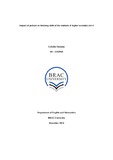| dc.description.abstract | Language learning process is no longer confined to books and pages; rather computers have been added to the field of education. In Computer Assisted Language Learning (CALL) teachers can ―challenge the traditional teaching and learning methods‖ (Hasan & Hoon, 2013, p. 130) by incorporating computer technology into language teaching process. One of the tools of CALL, which was not originally designed; but can be used for language learning, is podcast (McBride, 2009). Podcasting has ―huge potential‖ in improving learners‘ listening and speaking skills (SZE, 2006, p. 126). This study attempted to find out the impact of podcast in developing listening skills from Bangladeshi context. It mainly focused on students from the higher secondary level. The researcher tried to figure out the answers of these three questions: a) Can learning through podcast have any impact on developing listening skills of higher secondary level students in an EFL context of Bangladesh? b) Does the exposure of English speech through podcasts have any impact on improving speaking skills of higher secondary level students in an EFL context of Bangladesh? c) Will or will not the flexibility and accessibility of podcast work as reinforcement in making Bangladeshi EFL students autonomous learners? Besides, 140 students of higher secondary level from a college participated in the process of data collection. Stephen Krashen‘s (1982) input hypothesis and Richard Schmidt (1990) noticing hypothesis were used to analyze the data. By addressing the discrepancies, particularly in higher secondary level, between CLT textbook provided by NCTB, and ―assessment technique‖ (Matin, 2012, p. 234), this study showed students‘ language learning development through podcast.
Running head: IMPACT OF PODCAST ON LISTENING SKILLS 3
Impact of Podcast on Listening Skills of the Students of Higher Secondary Level Since learners never receive proper scope of listening in the English language classroom (Bhattacharjee, 2008), listening skill has been one of the marginal skills in Bangladeshi context. Due to lack of exposure to English language, students of Bangladesh might not get the scope to develop their listening skills. In Communicative Language Teaching approach, four skills of English language learning: reading, writing, listening and speaking are equally emphasized (Abedin, 2012). The higher secondary level students of Bangladesh are given communicative textbook which gives opportunities to acquire communicative competence in English through ―regular practice‖ of these four skills (Iftakhar, 2012, p. 183). However, listening and speaking skills are left out since no board examinations contain questions focusing on these skills (Matin, 2012). As a result, even after studying English for years; students who belong to higher secondary level from Bengali medium, ―lack proficiency and face problems‖ in English communication (N. Chowdhury & Shaila, 2011, p. 74). In order to develop listening skills and listening competence, podcast might play a significant role. Podcast is considered a ―new technology‖ for developing students‘ listening and speaking skills (SZE, 2006, p. 127). Since it offers plenty of materials online, learners can have access to those whenever they want through internet. It is true that in Bangladesh, podcast has not yet been implemented. However, the impact can be assumed considering its advantages and disadvantages. This study will find out whether podcasting, from Bangladeshi perspective, can improve listening skills of higher secondary level students. | en_US |

